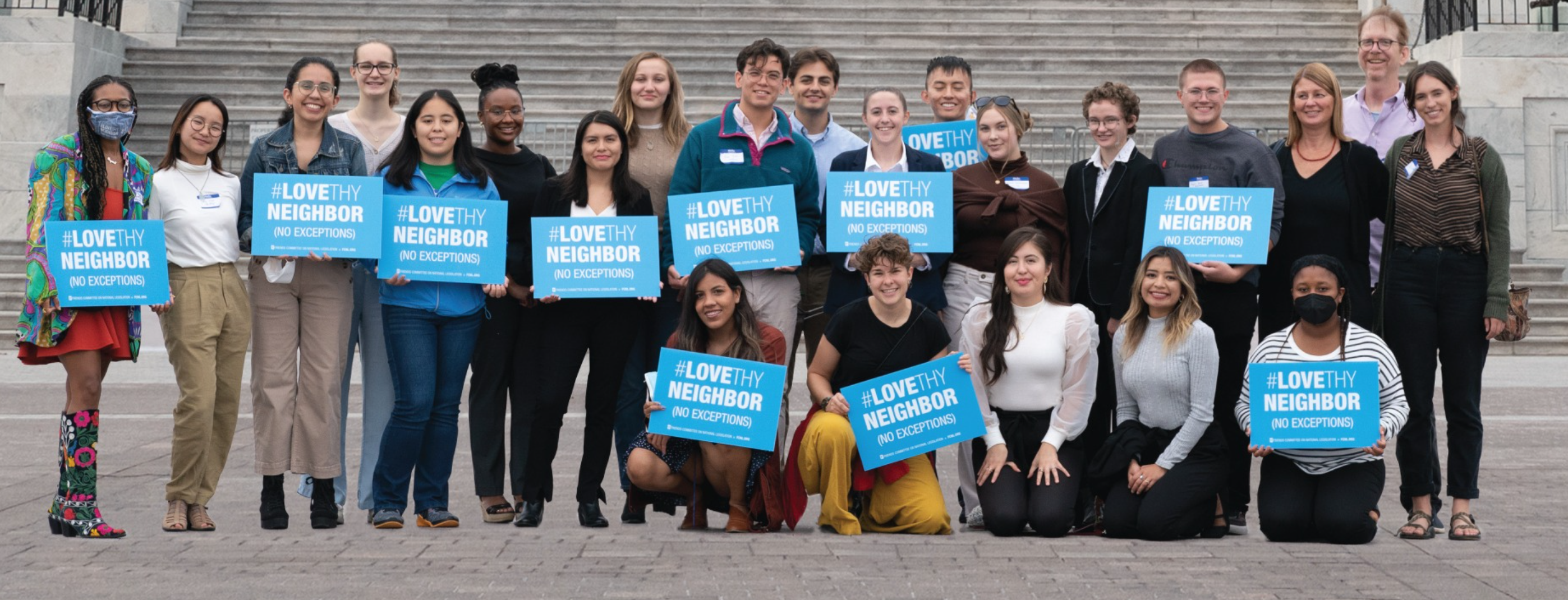“I was able to step into the role feeling a lot more confident.”
Susan Nahvi, MGO, Friends Committee on National Legislation
Susan Nahvi started her career at the Friends Committee on National Legislation straight out of college doing advocacy work as a lobbyist.
She was drawn by the opportunity to make a significant difference in the world and was aligned with the values promoted by this Quaker organization.
“When they talked about wanting to create a world free from war and the threat of war, wanting to be better stewards of the environment, wanting to create a society where everyone can fulfill their full potential… I thought, I love all those things. I want to help achieve all of those things,” says Susan.
During her first year at the organization, she became acquainted with fundraisers on staff.
“I realized how much overlap there was between their work and the work I was doing. And there was a lot of overlap between the work I really enjoyed and the work that they were doing.”
Susan said she saw that both jobs were “really about getting to chat with folks about the exciting work your organization was doing. And then at the end of a conversation, making an ask of somebody.”
While she was asking a representative to co-sponsor a bill or support a piece of legislation, the fundraisers were asking for a financial gift.
When a major gift position became open, Susan jumped at the opportunity and got the job.
“I was able to draw on a lot of the advocacy experience that I had,” she says. “That’s the part of the job I love the most – getting to chat with folks and connect personally about the work that the organization is doing. And not only chatting, but also listening.”
She says that one of the most important things she learned during her time as a lobbyist was that you didn’t need to “talk the person’s ear off and convince them. A lot of the time, it’s about listening to them and hearing what are the things they care about, where are areas of agreement, what are the things we do that they are excited about.”
What was the most difficult part of making the transition?
“Definitely it was getting comfortable making the money ask,” Susan says. “Money is not just a thing most people are used to talking about casually in conversation with other folks. That was definitely an adjustment for sure.” Fortuitously, just as Susan was starting as a major gift officer, her organization began working with the Veritus Group.
“I walked in and right away they signed me up for the Veritus Certification Course for Major Gift Fundraisers,” she says. “And that was a really wonderful base to get under me as I was starting that work because it really outlined the whole process for me.
“We learned things like how to do an introductory call with someone, or how to think about the kind of outreach that you’re doing. Like is this a ‘you-made-a-difference’ outreach where you’re explaining the impact they’re having. Or it this more of a ‘demonstrating-the-need’ touchpoint that you’re doing? So, the course really laid that out and gave me a good foundation.
“And so, I was able to step into the role feeling a lot more confident after that rather than feeling like I was just figuring it out.”
Susan also learned about Permission-Based Asking™, which helped overcome her biggest obstacle.’
“One thing I took away is that when you’re making an ask of someone, they shouldn’t be surprised that you’re making that ask of them. If they feel it’s like coming out of nowhere, you haven’t really done your job in preparing the ground for that conversation.”
“I really like the Permission-Based Asking model because it takes away some of the nervousness around making an ask. It just makes sure everyone’s on the same page,” she says. “It means that that person is ready for that conversation, and ready for that ask. It’s based on mutual consent, and it’s a much more positive feeling and interaction, even if they say no.”
Susan says that one of the reasons her organization chose to work with Veritus was an alignment on the importance of relationship building.
“That was something that was very important in our program, and I know it is very important to Veritus as well,” she says. “So that was a really good fit.”
This emphasis on relationships and working hard to understand the donor’s passions and interests has helped Susan get to know her donors better and take her fundraising to a different level.
“Sometimes, a wonderful problem that we have with people is that we ask supporters, ‘You know, which areas of our work are you interested in,’ and they’ll say, ‘Oh everything!’ Which is so wonderful and it’s a real blessing, but sometimes digging a little bit deeper can be a little bit harder. If you say you’re interested in everything, how do I update you on everything all of the time?”
So, Susan says she now spends more time thinking strategically about how to line up an offer with the donor’s interests and how to introduce that offer over time.
And this approach has paid off.
She tells the story of one longtime donor who had given to a capital campaign, but had not embraced any particular programs, and was not closely engaged with the organization.
“I saw an opportunity there,” says Susan. “I thought I’d love to talk to this person a little bit more about different programs we have going on, see what might catch this person’s interest.”
Susan had a hunch that this donor might be interested in a project to repair a building called Friends Place on Capitol Hill, long used to house advocacy groups coming to Washington, D.C.
“I knew this person really appreciates educating young adults on advocacy issues, I knew this person really enjoys seeing something tangible to come of their support, and that they’ve supported other building funds in the past, including our capital campaign. So, I started introducing that project in earlier conversations, and had our then general secretary also reach out to this person and chat with them a little bit about the project as well.
At the end of last year when in-person visits finally again became possible, Susan met with the donor in person.
“I got to hear a little bit more about their interests,” says Susan.
“And so, I thought, this seems like a really good alignment between the person’s passions and the work that we’re doing. And so, I made the ask, asking if they would support our repairs to this building at the level of $50,000.
“The Veritus process really helped me focus on building that relationship… then I was able to make an ask that they were excited about.”
The rest of the conversation went like this:
The donor asked, “How much do you need to reach your total goal?” Susan replied, “Our total goal was $1.2 million, and we actually need $59,000 to reach that goal.”
“Okay, we’ll definitely think about it, and we’ll get back to you.”
The next day, the donor reached back out and said, “Thank you so much for coming to us with this ask! We’d actually like to support you at the full $59,000 to get you to the $1.2 million goal for the repairs.”
“That was so exciting that they had wanted to do more than I had asked them for, and that they were really engaged by the project,” says Susan. “It was so exciting, because this was a project that we were focused on getting to this goal for. And it happened to really align with this person’s interests and they felt really good about giving to it.
“The Veritus process really helped me focus on building that relationship, laying the groundwork, finding out this person’s interests, and then being able to make an ask that they were excited about and that they were on the same page about with us.”
————————
Interested in learning more about how Veritus can boost your fundraising efforts? Fill out our free donor file assessment to get started. There’s no obligation to work with us, and you’ll have a better understanding of any hidden trends in your donor file. And feel free to check out more of our client success stories here.
Photo by DAG Photo/FCNL






0 Comments